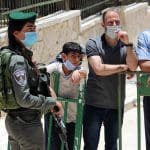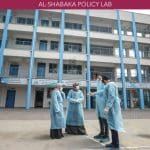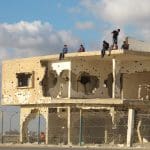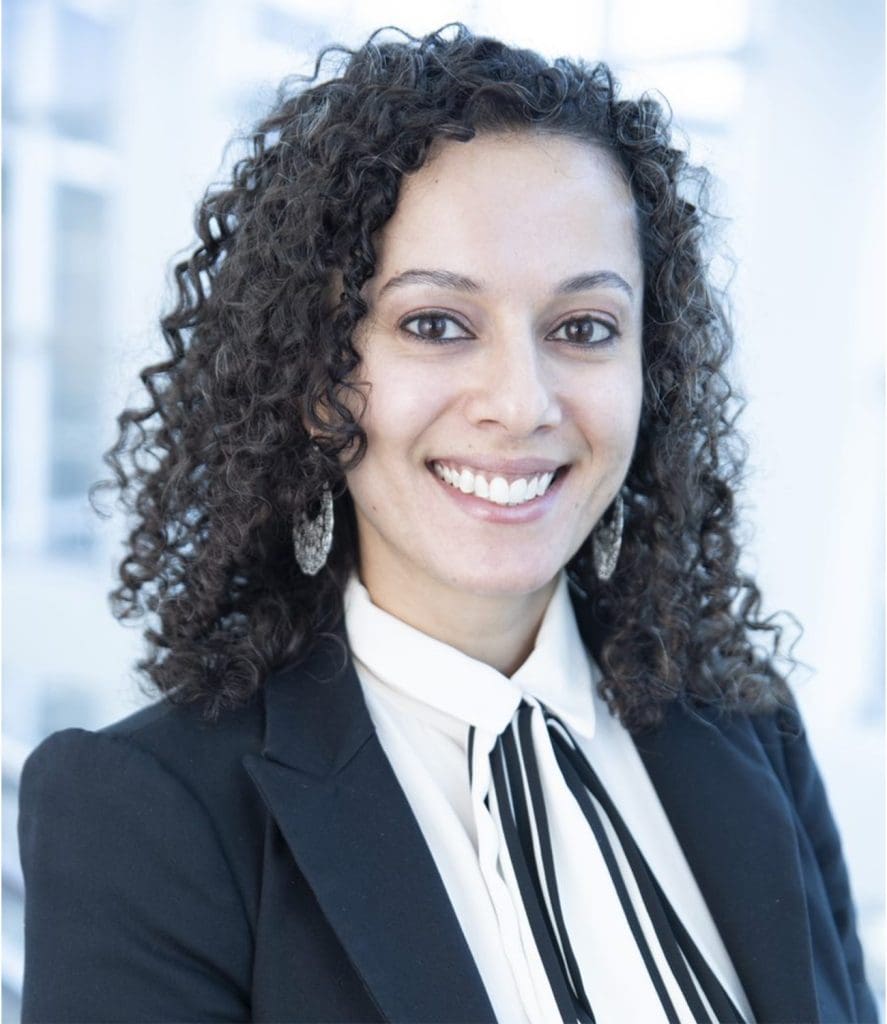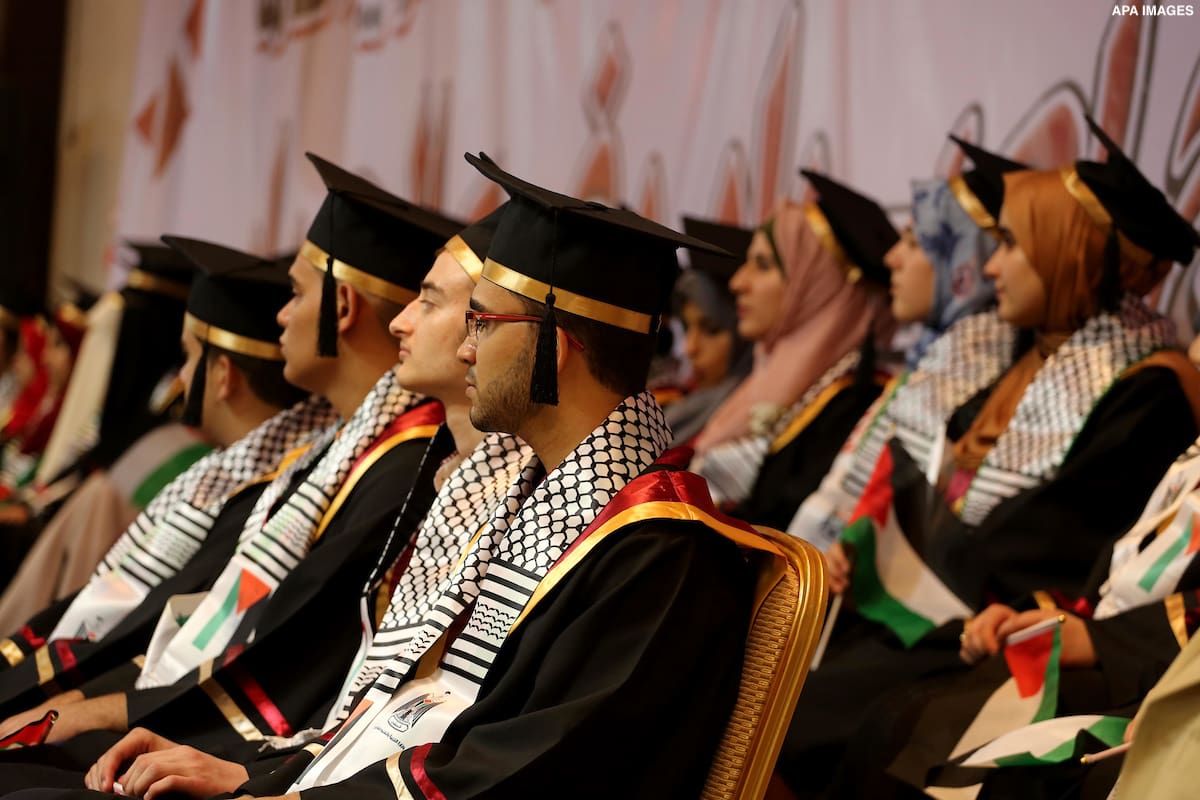
Executive Summary
What is the Palestinian vision for development that would bring about liberation? How can this vision be realized freely of donor-imposed conditions and restrictions? Specifically, how can the health and education sectors—which have been grossly neglected by Palestinian authorities in recent years—be developed by Palestinians in a way that promotes a collective vision for the future? A diverse group of 19 Palestinian scholars, activists, teachers, engineers, lawyers, doctors, shopkeepers, construction workers, and students in the West Bank, Gaza, behind the Green Line (Palestinian citizens of Israel), and in the diaspora were interviewed to answer these questions.
The Palestinian health system is in a state of crisis. While donor support has allowed the Ministry of Health (MoH) to boast of quantitative improvements in vaccination rates and life expectancy, there remain significant problems which impact the sector, not least of which is the ongoing fragmentation of the ministry between the West Bank and Gaza. The interviews revealed three themes that limit internal development in Palestinian health across the West Bank and Gaza: 1) dependence/outsourcing for many health services, 2) an overly paternalistic and medicalized healthcare establishment, and 3) lack of opportunities for a future in medicine.
While the realities of occupation limit Palestinian health in unique ways, there are initiatives that could begin to build a healthier populace and a more responsive health system, including:
- Emphasizing preventive and holistic wellness—including mental and physical health, children’s health, women’s health, and the health of people with disabilities— to bring health and well-being back into community spaces.
- Reforming medical education to reflect the realities of where these doctors will work. Trauma medicine, and even advanced training for first responders and emergency medical technician (EMTs), would reduce mortality for Palestinians injured as a result of Israeli state or settler violence.
- Incentivizing Palestinian doctors and other medical personnel who train abroad to return to practice medicine by guaranteeing them a secure job and salary.
- Engaging with the medical establishment, including the MoH in the West Bank and Gaza, to develop a new and independent model for Palestinian medicine, public health, and wellness. This would engage stakeholders outside of the calcified health system who can advocate for underserved populations, and, importantly, decrease Palestinian dependence on Israeli and foreign health systems.
The importance of education was also emphasized by all interviewees; however, some pointed to the cynical reality of this perspective, which, in recent years, has led to a highly educated Palestinian society with very few opportunities for employment or continued education. Four themes emerged as the primary barriers to the development of a “liberation education” in the West Bank and Gaza: 1) outdated approaches to pedagogy, 2) outsized influence by donors, 3) a view of education primarily as a path to employment, and 4) opposition to reform within the Palestinian Authority (PA) and Hamas.
Many interviewees criticized the “laziness” of Palestinian authorities when it comes to educational reform. Several also critiqued the education system for being heavily skewed by donor interference, including in textbook content. While the deficits in the education system are exacerbated by Israeli movement restrictions, which limit the recruitment of faculty and other needed professionals, the ability of students to engage with diverse speakers or travel across their territory for events, and overall opportunities for critical engagement, there are areas where internal transformation is possible:
- Palestinian leadership must invest in curricular development that restores a sense of agency among students, modeled after approaches such as abolitionist education and the community education practiced during the First Intifada. The education system must be inclusive, it must incorporate lived experience, and it must raise the consciousness of the individual.
- Communities should supplement traditional education with cultural education, including plays, talks and debates, olive harvesting events, traditional dance troupes and bands, and so on.
- Concerted efforts should be made to create legitimate and credible content on social media to engage youth with their history and identity.
- Palestinian leadership should invest in vocational and non-traditional schooling and push donors to meet existing educational gaps.
- Palestinian leadership and civil society should incentivize and encourage Palestinians who go abroad for education or training to return and work in Palestine, even if temporarily.
The idea that Palestine could not merely change but could serve as a center for a new kind of liberation was a hopeful note that came up in several interviews: “We should be the ones to solve these kinds of problems internally and ‘sell’ our solutions abroad.” The consensus, however, was that meaningful change is not going to come from the outside and that Palestinians must have a clear and collective vision for their future in order for this change to occur.
What is the Palestinian vision for development that would bring about liberation and free Palestinians of donor-imposed conditions and restrictions? A diverse group of 19 Palestinian scholars, activists, teachers, engineers, lawyers, doctors, shopkeepers, construction workers, and students in the West Bank, Gaza, behind the Green Line (Palestinian citizens of Israel), and in the diaspora were interviewed to answer this question. 1 While they differed in many ways, nearly all brought up the same concern: there is currently no vision for Palestinians, and without a vision, it is hard to imagine a future different than the current reality in which development and aid are conditional on Palestinian authorities’ adherence to the requirements of the international donor community. Indeed, since the 1993 Oslo Accords, the model of development in the West Bank, including East Jerusalem, and Gaza has prioritized donors’ political agendas over the rights and needs of the Palestinians. This lack of vision can lead to apathy and disconnection. As one interviewee lamented, “It turns into a loathing of country in a way—at a certain point, you ask, why do I need to be tied to this place so much if I can’t survive, let alone thrive?”2
In these interviews, barriers to and possibilities for locally-led development were explored in the health and education sectors. Health is a fundamental human need and right, and a population that struggles to procure basic health services is unlikely to have the mental and physical capacity for the critical work needed for liberation. Education, also a human right, is similar: an educated population is best poised to think deeply and creatively about problems presented as intractable. The sectors are also interrelated: a healthy population is best able to be educated, and an educated population is more likely to be healthy. Lastly, these sectors are overlooked by Palestinian authorities, who grossly overspend on the security sector; investment in health and education has thus stagnated in recent years.
The results of these interviews and the subsequent analysis are presented in two forms in this policy brief: a narrative exploration of the themes, followed by practical steps that could be taken by Palestinians within the West Bank and Gaza without external actors, all punctuated with quotations from the interviews. The brief does not discount the role of occupation, siege, trauma, and lack of accountability in perpetuating the poor outcomes for Palestinians. Further, it does not overlook the multiple layers of internal Palestinian dysfunction, including corruption, nepotism, and economic dependence that prevent Palestinian leadership from prioritizing the Palestinian people’s needs. Instead, it aims to restore agency to the Palestinians in wrestling with these ongoing realities; they need to decide their future independently and collectively.
A Palestinian Approach to Health and Education
Health
A college student in Gaza said during an interview: “It is terrifying to realize at some point that I could die because of the corrupted health care system. A disease that any country could deal with, my country cannot.” This is the state of the Palestinian health system which came under the administration of the Israeli Ministry of Defense in 1967 until the Palestinian Ministry of Health (MoH) was established with the 1993 Oslo Accords.
The (Palestinian) Ministry of Health inherited a broken system that remains fragmented to this day Share on X
The MoH inherited a broken system that remains fragmented to this day. With donor support, the MoH has been able to boast of quantitative improvements in areas like vaccination rates and life expectancy, despite being divided into two ministries in the West Bank and Gaza because of the political rift between Fatah and Hamas. Regarding social determinants of health, however, there remains a significant gap between what is needed and what is available. The interviews revealed three themes that limit internal development in Palestinian health across the West Bank and Gaza: 1) dependence/outsourcing for many health services, 2) an overly paternalistic and medicalized healthcare establishment, and 3) lack of opportunities for a future in medicine.
All of the medical or public health professionals interviewed first mentioned external dependence and outsourcing as one of the main barriers to Palestinian health, and as both a cause and a result of a lack of Palestinian development in the health sector. Many of the causes of outsourcing are a result of Israeli restrictions on the movement of Palestinian people and goods. One retired physician who worked in Nablus pointed to the lack of specialization in the West Bank and Gaza, despite some Palestinians being trained abroad: “You cannot attract people with expertise. Highly trained Palestinians who try to come back end up leaving. They get paid more and enjoy higher quality of life elsewhere. We tried to find a pediatric cardiac surgeon—nearly impossible.” While the reasons for this brain drain differ across the fragmented geography of colonized Palestine, the resulting gaps left in the healthcare system have the same negative effects.
There are many specializations missing entirely, and not due to lack of interest. “There are people who want to specialize or serve in administrative medical roles—but how and where will you train to be a neurosurgeon?” the retired physician asked. Another interviewee described an NGO initiative to hire physicians during the COVID-19 pandemic, but they were almost entirely without specializations and some even without experience. Thus, they have been unable to serve those who require more than the basic standard of care.
As a result, even lab tests are sent to Israel for processing. This outsourcing includes the medical permit system, which has entrenched a dependence on the Israeli medical system, run by the Israeli military but paid for by Palestinian authorities. This system has resulted in significant health inequities and poor outcomes, especially for Palestinians in Gaza. Ultimately, dependence begets dependence, and Palestinian authorities and the donor community continually fail to push for Palestinian health sovereignty because of the cushion of outsourcing.
The character of the Palestinian medical establishment was also widely criticized. In the creation of the current MoH during Oslo, indigenous medicine was disparaged and the health system that was created was built to reflect the western health systems that resembled those of its donors: efficiency over quality, capitalist over collectivist, and paternalistic over inclusive. As one physician described, “Prior to Oslo, the atmosphere was ‘we are under occupation, we are in the same boat, no discrimination.’ People helped each other. There was more compassion. Now, there is competition and exploitation, even in health. Hospitals are there to make money. In the old days, specialists would volunteer. That atmosphere is gone.”
The system is also highly biomedical, and rarely considers psychosocial aspects of health outside of several local organizations that work to support mental health and functioning. A graduate student in health policy mentioned that the health system “does not recognize the legitimacy of public health and epidemiology. It is not holistic. Once a year, there is a lot of advocacy around breast cancer awareness. This is essentially public health in Palestine. It says nothing about wellness. Is this a well society? No.”
The lack of medical professionals was also cited as a significant issue, especially in Gaza. “We do not have even the most basic elements of making sure we have a healthcare system that will outlive the current generation of doctors,” one interviewee warned. Doctors who work in the public sector run the risk of pay cuts or long periods with no pay, so those who are able find work in the private sector. One interviewee described a joint program between a high-ranking medical school in the US and Al-Quds University. Only one of the participants returned to Palestine; they were unable to find a residency and are currently working as a nurse. As the interviewee noted, “Everyone is looking for a position in the West.”
Dependence begets dependence, and Palestinian authorities and the donor community continually fail to push for Palestinian health sovereignty because of the cushion of outsourcing Share on X
In recent years, the field of global health has engaged in difficult conversations about decolonization. One interviewee suggested that Palestine, more than any other place, could serve as a model of that movement in global health, as it has for other decolonization and liberation movements in the past. While the realities of occupation limit Palestinian health in unique ways, there are initiatives that could begin to build a healthier populace and a more responsive health system, including:
- Emphasizing preventive and holistic wellness—including mental and physical health, children’s health, women’s health, and the health of people with disabilities— to bring health and well-being back into community spaces. This would decrease dependence on advanced health services only available outside of the West Bank and Gaza, and would encourage hiring a more diverse and representative workforce.
- Reforming medical education to reflect the realities of where these doctors will work. Trauma medicine, and even advanced training for first responders and emergency medical technician (EMTs), could reduce mortality for Palestinians injured as a result of Israeli state or settler violence. Emphasis on training in mental health and social determinants of health should also be provided across health education, including prioritizing the retention of medical specialists. There should also be greater training for nurses, midwives, occupational and physical therapists, and community health workers to ensure local care is available at a high quality, even in times of restricted movement. Telehealth and texting services could also be adopted for medical triage purposes in times of restricted movement or for providing information and services about sensitive topics like domestic abuse and mental health struggles.
- Incentivizing Palestinian doctors and other medical personnel who train abroad to return to practice medicine by guaranteeing them a secure job and salary. Further incentives should be provided if they are then able to themselves train medical students in Palestine. Recognizing the challenges presented by professional brain drain, state funding, and donor resources should be specifically earmarked for this purpose.
- Engaging with the medical establishment, including the MoH in the West Bank and Gaza, to develop a new and independent model for Palestinian medicine, public health, and wellness. This would engage stakeholders outside of the calcified health system who can advocate for underserved populations, and, importantly, decrease Palestinian dependence on Israeli and foreign health systems.
Education
The importance of education was emphasized by all interviewees, and indeed, education is traditionally highly valued in Palestinian society. However, some pointed to the cynical reality of this perspective, which, in recent years, has led to a highly educated Palestinian society with very few opportunities for employment or continued education. Four themes emerged as the primary barriers to the development of a “liberation education” in the West Bank and Gaza: 1) outdated approaches to pedagogy, 2) outsized influence by donors, 3) a view of education primarily as a path to employment, and 4) opposition to reform within the governing bodies of the West Bank and Gaza.
The Palestinian education system is built upon the remnants of the Egyptian and Jordanian systems during their occupations of Gaza and the West Bank, respectively, from 1948 to 1967. Even during the initial decades of Israel’s occupation of the West Bank and Gaza, and prior to the Oslo Accords, these systems remained in place, but under the authority of the Israeli Civil Administration. Jordanian and Egyptian curricula were still used, but they were subject to heavy censorship, and schools experienced regular closures and attacks. The Palestinian education system, from primary school to higher education, lagged significantly as it was devalued by Israel, pushing many Palestinians to seek menial labor in Israel.
A formal Palestinian Ministry of Education (MoE) was formed when the Palestinian Authority (PA) was created in 1994. Without sovereignty, it inherited a weak education system, yet it did make significant curricular changes and revitalized school facilities with the heavy financial support of donors. Under the purview of the MoE (which, like the MoH, is split between the Hamas-run government in Gaza and the Fatah-led PA in the West Bank), literacy and enrollments in school have increased, similar to the quantitative advances made in the health sector. Yet there remains a large chasm between the education system that exists and a system that can support meaningful improvements in Palestinian life.
Interviewees, most of whom went through the Palestinian education system themselves, criticized the “laziness” of Palestinian authorities when it comes to educational reform, especially in the early years of the Oslo period. Many disagreed with the memorization/regurgitation model of primary and secondary education, culminating in the tawjihi, a placement exam taken at the end of a student’s schooling, based on the Jordanian system. Not a single interviewee defended this model, pointing out that it perpetuates class divides and creates immense pressure on students and their families, resulting in social shame if a student is unsuccessful. While students in private schools may be afforded other opportunities or can afford specialized tutoring, a poor showing on the tawjihi can be especially detrimental for students attending public schools.
There remains a large chasm between the education system that exists and a system that can support meaningful improvements in Palestinian life Share on X
The tawjihi does not reward creative or innovative thinking, but a student’s ability to perform on a very technical exam in a tight time period. Only students who score well on the tawjihi may then apply to top-ranked programs at universities, like medicine and engineering. This poses another problem, as one interviewee described: “The smartest students are not necessarily the ones who do best on the tawjihi, and suddenly, their whole future and standing in the community is determined by this one exam.”
Aside from lack of vision, several interviewees speculated that Palestinian authorities are also too concerned with the response of the international community to make meaningful reforms to education. This brings us to the next barrier, which is an education system that is heavily skewed by donor interference. “Education can and should focus on liberation, struggle, and history—donors want to focus on jobs,” one interviewee argued. This includes intervention in the curriculum itself. “There are people in Palestine who can create the curriculum, but Palestinians are not free to decide what topics or themes should be taught,” another interviewee mentioned.
Palestinian textbook content is often attacked by Zionist groups, so donors are wary about any perceived “political content” in textbooks and schools they support. One example recounted by an interviewee was when textbooks in Gaza that featured the Arabic names of primarily Palestinian cities in territories behind the Green Line had to be changed due to donor demand. Donor intervention in education has also accelerated this push to a focus on individual over collective values. As one former public-school student described it, “don’t expect the state to provide you with services. You need to sustain yourself economically.”
This brings us to higher education. The current and former college professors interviewed noted that university education is not as rigorous as it should be or used to be and is highly centered on lectures over more innovative teaching methods. As one professor said, “It is not focused on motivating young people—sending them home with different ideas, opportunities for field work, or opinion polls—there is no emphasis on getting them to critically engage with the material.”
Another professor interviewed who worked in a Palestinian university before the First Intifada lamented the shift that occurred during his time in the academy: “In the 1980s, there was some approach to critical thinking. We wanted the university to not just be a place to regurgitate information. In the 1990s, the universities started to resemble the broader ‘Arab university’ where the political authority had a say in things.” He observed that many of the “best and brightest” students and professors began to leave for opportunities abroad, and that degrees from the US or Europe began to be more highly valued than those from Palestinian or even other Arab institutions.
The other issue is the view of education, and especially higher education, as primarily a path to employment, despite significant evidence to the contrary. This has led to more individualistic and neoliberal values that were less present in the early years of occupation, and it has also stifled creativity. One interviewee questioned: “What is the purpose of education? We went from an education designed around liberation, freedom, and empowerment to an education that teaches students how to get jobs that don’t exist in Palestine.”
With this in mind, many pointed to the reality that Palestine lacks workers in certain crafts or trades, but there are limited vocational educational opportunities to fill these employment gaps. Several interviewees also commented on the lack of creativity in extracurricular experiences and how that stifles meaningful development. “There are no green spaces, no places to express yourself, no area for inspiration, and no organization. It wears on people,” one interviewee lamented.
The top universities in Palestine, like Birzeit, used to function as fertile grounds for political awakening and critical thinking. Now, as many interviewees described, unchallenged political appointments within institutions, overt interference from boards of trustees and other non-academic entities, and frustration among faculty and staff that nothing gets done “without knowing the right people,” have pushed universities to limit their contributions to the community. “The university should influence the society,” one academic insisted. “Instead, the city came to run the university,” whereby universities became limited by the politics of governing bodies. Moreover, when students do become politically active and engaged, or think creatively and challenge norms, they risk arrest, detention, or imprisonment by Palestinian or Israeli forces.
This leads to the final barrier: opposition to educational reform by Palestinian authorities at any level of schooling. This was expressed by one of the interviewees: “The PA does not want students to think critically or understand basic knowledge about their history and identity, so many Palestinian young people are really disoriented.” As with the health system, Palestinian authorities pride themselves on the quantitative improvements made in literacy and enrollment, but they “don’t go beyond that when it comes to education.” Another interviewee pointed out the deliberate de-development of Palestinian education by the PA: “The education system is what it is because the PA is a colonial tool. It may make reforms, but it is never going to be revolutionary.”
The impact of occupation has been highly detrimental throughout all levels of the Palestinian education system. Many of the deficits recognized above are exacerbated by Israeli movement restrictions, which limit the recruitment of faculty and other needed professionals, the ability of students to engage with diverse speakers or travel across their territory for events, and overall opportunities for critical engagement. Yet there are areas where internal transformation is possible:
- Palestinian leadership must invest in curricular development that restores a sense of agency among students, modeled after approaches such as abolitionist education and the community education practiced during the First Intifada. This means challenging donor perspectives on what should be taught, shifting from the traditional memorization model to include reflection and application on practical and relevant issues, and reforming or entirely eliminating the tawjihi. The education system must be inclusive, it must incorporate lived experience, and it must raise the consciousness of the individual.
- Communities should supplement traditional education cultural education, including plays, talks and debates, olive harvesting events, traditional dance troupes and bands, and so on, to rebuild collective thinking, strengthen Palestinian identity in younger generations, and offer outlets for creative expression.
- Concerted efforts should be made to create legitimate and credible content on social media to engage youth with their history and identity. As one interviewee said, “Facebook is the main space for news, knowledge, and education.”
- Palestinian leadership should invest in vocational and non-traditional schooling and push donors to meet existing educational gaps. This would allow for Palestinians to meet the professional needs of society while increasing employment that helps to retain social capital. The West Bank and Gaza need plumbers, electricians, mechanics, cosmetologists, and other specialists who do not require a college education. This would also create space for blue collar work that is not dependent on labor in Israel.
- Palestinian leadership and civil society should incentivize and encourage Palestinians who go abroad for education or training to return and work in Palestine, even if temporarily. Material and non-material incentives should be offered to nationals to come back and work as a form of “public service,” as one interviewee described.
Palestine as a Model for Liberation
The idea that Palestine could not merely change but could serve as a center for a new kind of liberation was a hopeful note that arose in several interviews: “We should be the ones to solve these kinds of problems internally and ‘sell’ our solutions abroad.” But is it reasonable to put the burden of development on a colonized, occupied people? Many of the interviewees wrestled with this question. The consensus, however, was that meaningful change is not going to come from the outside and that Palestinians must have a clear and collective vision for their future in order for the change to occur. As one interviewee poignantly said, “When people know where they are heading, they will amaze you with their sacrifice. When they do not know where they are heading, they will not lift a finger.”
In terms of future visioning, one interviewee asked: “Is the goal to create development and an economy around survival or to create an economy and development process aimed at liberation? If it is liberation, you have to know that you are not going to be as economically comfortable.” In the end, “something will happen,” as one interviewee put it. “This wheel will break, and we have to be ready. We need to create something completely new— a new national movement. We are living in a new age with new technology and a new kind of economy. Palestinians are everywhere, and we need to think creatively.”
- To read this piece in French please click here. Al-Shabaka is grateful for the efforts by human rights advocates to translate its pieces, but is not responsible for any change in meaning.
- Some quotations in this brief were lightly edited to account for translation and readability.
Dr. Yara M. Asi is an Assistant Professor at the University of Central Florida in the School of Global Health Management and Informatics. Her research agenda focuses on global health, human rights, and development in fragile populations. She is a Non-resident Fellow at the Arab Center Washington DC, a 2020-2021 Fulbright US Scholar to the West Bank, the Fall 2021 US Fellow at Al Shabaka Palestinian Policy Network, and the co-chair of the Palestine Health Justice Working Group in the American Public Health Association. Along with working at one of the first accountable care organizations in the United States, she has also worked with Amnesty International USA and the Palestinian American Research Center on policy and outreach issues. She has presented at multiple national and international conferences on topics related to global health, food security, health informatics, and women in healthcare, and has published extensively on health and well-being in fragile and conflict-affected populations in journal articles and book chapters. Her work has also been featured in The Washington Post, The Guardian, The Nation, +972 Magazine, The Conversation, Al Jazeera, The World, and other outlets. Her forthcoming book with Johns Hopkins University Press will examine war as a public health crisis.










